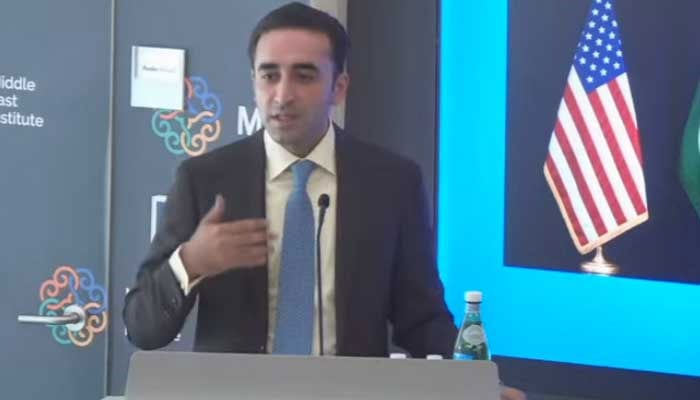
Former foreign minister and Pakistan Peoples Party (PPP) Chairman Bilawal Bhutto-Zardari has warned that India’s shutting of Pakistan’s water supply is tantamount to laying the foundation for first nuclear water war.
Addressing an event at Middle East Institute, Bilawal said that if India was serious about combating terrorism then they had to create more conducive environment in Indian Illegally Occupied Jammu and Kashmir (IIOJK).
“You cant cage an entire population and bulldoze their houses and blind them with pellet guns and expect them not to react.”
He warned that India shutting of Pakistan’s water supply was laying the foundation for first nuclear water war.
The PPP chairman said: “We have said cutting off Pakistan’s water supply would be an act of war we don’t say it in jingoistic manner. Its an existential crisis for us.”
He maintained that any country on the planet no matter their size, strength or ability would fight for their survival and fight for their water.
“India must abide by the Indus Water Treaty. United States, other countries must take a firm stance that they will not only allow India to violate Indus Water Treaty but take their threat forward,” he added.
“You cannot allow their precedent to be set in Pakistan context. We will fight the first war but it wont be the last,” Bilawal warned.
‘Indian actions boost nuclear risk in future conflict’
In an interview with Bloomberg, Bilawal warned that India’s use of a supersonic missile with nuclear capabilities by India during the recent standoff with Pakistan had made the situation more precarious.
He said that the New Delhi’s move presented a new danger in future clashes, adding: “Now we then have about 30 seconds time to decide, off a grainy little image, this nuclear-capable missile — is it armed with a nuclear weapon? And how do we respond?”
India had lowered the threshold for future military action between the nuclear-armed neighbours, he added.
Bilawal, who is currently in New York and heading a nine-member high-level parliamentary delegation, forcefully presented his country’s message of “peace with dignity and equality” at the United Nations (UN) this week.
A comprehensive dialogue between the two sides could prevent future conflicts, which could escalate suddenly and be difficult for leaders to intervene in, said the former foreign minister.
“Our concern for next time, heaven forbid, for next time round is that the threshold is low for a military conflict,” he added.
In a future conflict, Bilawal further said that both countries are likely to climb the “escalation ladder” too quickly for President Donald Trump or other leaders to intervene.
Categorically dismissing Indian allegations about the Pahalgam attack in Indian Illegally Occupied Jammu and Kashmir (IIOJK), he said that New Delhi did not provide a shred of evidence.
“You just need an accusation, and you launch into a full-blown war with Pakistan,” he added.
“The new sort of normal — or we call it an abnormal — that the Modi government is trying to impose on the region is that if there’s a terrorist attack anywhere in India, mainland India and Indian-occupied Kashmir, you don’t have to provide a shred of evidence,” Bilawal said.
It is pertinent to mention here that following the US-brokered ceasefire between the two sides, Indian Prime Minister Narendra Modi had said India wouldn’t hesitate to use force against “terrorist camps” in Pakistan again, calling the response a “new normal” in relations.
He said: “Therefore, from our perspective, it’s the utmost importance that Pakistan and India engage in a comprehensive dialogue.”







